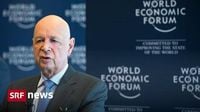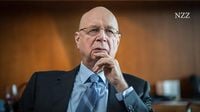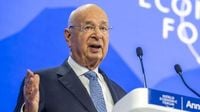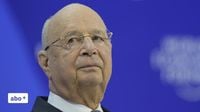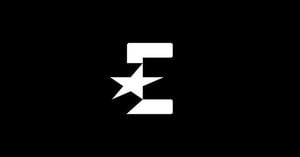Klaus Schwab, the founder of the World Economic Forum (WEF), has resigned effective immediately over the Easter weekend, a move that has sent shockwaves through the global community. His resignation, which came as a surprise to many, was allegedly accelerated by an anonymous letter sent to the WEF's Board of Trustees, according to a report by the Wall Street Journal. The letter accuses Schwab and his wife, Hilde, of misusing WEF funds, prompting the Board to initiate an investigation into the allegations.
The 87-year-old Schwab had previously indicated he would step down only when a suitable successor was found. However, the sudden nature of his resignation raises questions about the circumstances leading to this pivotal moment in his 55-year tenure at the helm of the WEF. Peter Brabeck, the former CEO of Nestlé, has been appointed as interim president while the Board navigates the fallout from these serious accusations.
According to the anonymous letter, which reportedly originated from current and former WEF employees, Schwab is accused of instructing staff to withdraw large sums of cash for personal use and of organizing meetings under false pretenses to justify luxury travel expenses. The letter also alleges that the Schwab family improperly utilized a WEF-owned villa on Lake Geneva, mixing personal and institutional interests without oversight.
Schwab has vehemently denied these allegations, stating through a spokesperson that he plans to take legal action against the authors of the letter and anyone who disseminates what he calls false claims. "We will pursue legal action against the originators of the letter as well as against the dissemination of these false accusations," the spokesperson stated.
The WEF Board of Trustees confirmed the initiation of an investigation in a statement to the Financial Times, emphasizing that the decision was made after consulting with external legal advisors and in accordance with the forum's fiduciary responsibilities. The Board expressed its seriousness regarding the allegations but noted that they remain unproven at this time.
Peter Brabeck, who has been involved with the WEF since 1998 and served as Vice President of the Board, now faces the challenging task of leading the organization through this turbulent period. He has a deep understanding of the WEF's operations and has previously supported Schwab's vision of creating shared value for various stakeholders, not just shareholders.
Following Schwab's resignation, speculation has arisen regarding the reasons behind his abrupt departure. Some reports suggest that his decision was influenced by internal pressures and the growing scrutiny of his leadership style, particularly after previous allegations of discrimination against female employees surfaced last year. Those claims were reportedly resolved through an out-of-court settlement.
As the WEF navigates these allegations, the Board has made it clear that it intends to conduct a thorough and independent investigation. "We take these allegations seriously, but we will await the results of the investigation before making further comments," a WEF spokesperson said.
The anonymous whistleblower letter has raised concerns about the governance of the WEF, which operates under the supervision of the Swiss Federal Foundation Supervisory Authority. The Board's decision to investigate Schwab's conduct indicates a significant shift in the organization's internal dynamics, as it marks the first time that such serious allegations against its founder have prompted formal scrutiny.
Schwab's sudden exit has led to discussions about potential successors, with names like Christine Lagarde and Larry Fink being mentioned in the media. However, any new leadership will need to navigate the complex landscape left in the wake of Schwab's departure and the ongoing investigation.
For now, the WEF faces a critical juncture as it seeks to maintain its reputation and influence in the global arena. The outcome of the investigation and the subsequent decisions made by the Board of Trustees will likely shape the future direction of the organization.
As the world watches closely, the implications of Schwab's resignation extend beyond the WEF itself, potentially impacting the broader financial landscape in Switzerland and beyond. The organization has long been a prominent platform for global leaders and business executives to engage in dialogue about pressing issues, and its ability to continue doing so may hinge on the resolution of these serious allegations.
In conclusion, Klaus Schwab's resignation marks a significant moment in the history of the World Economic Forum, raising questions about leadership, governance, and accountability within one of the most influential organizations in the world. The upcoming investigation will be crucial in determining the future of the WEF and its founder's legacy.
